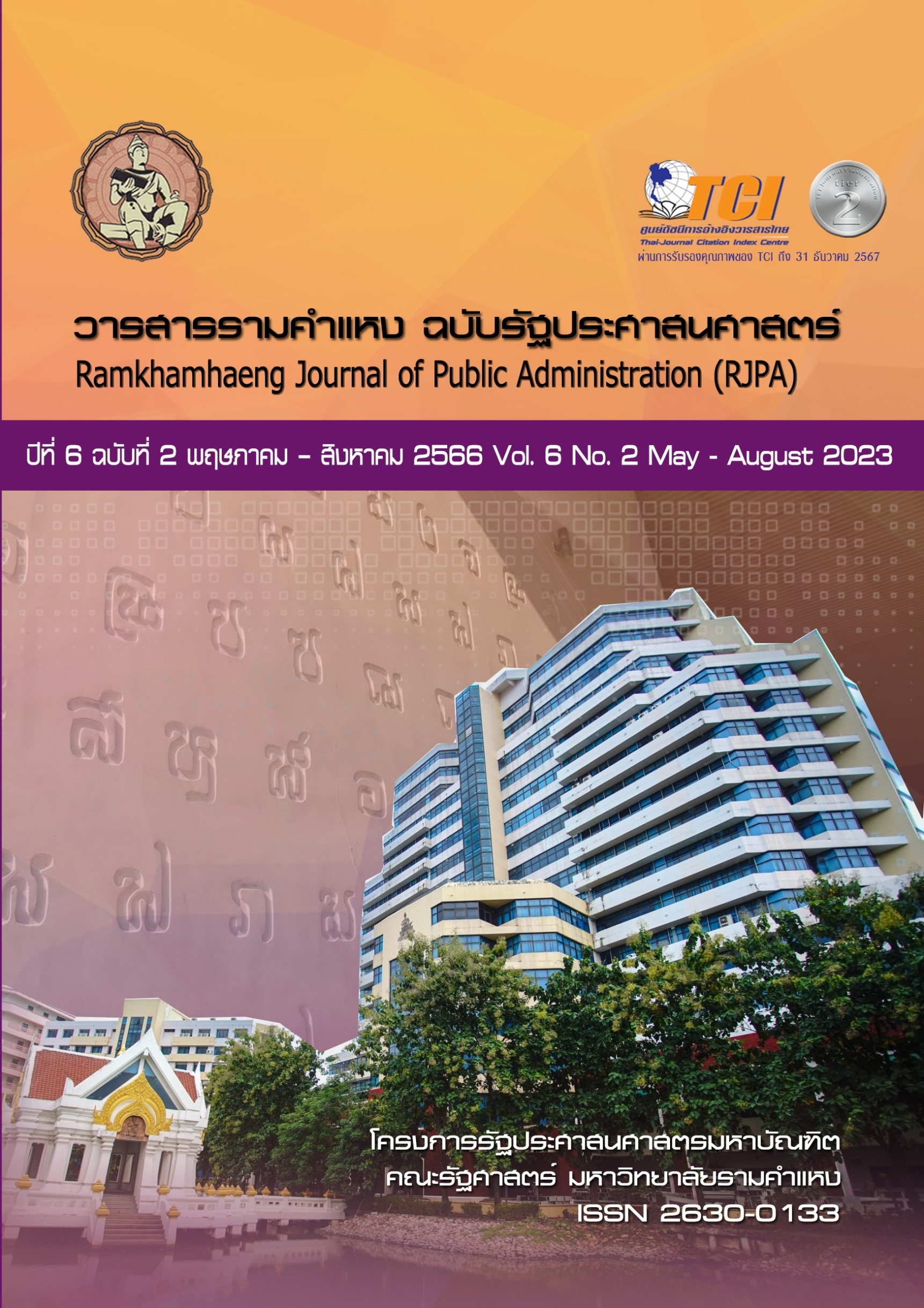Japan’s Official Development Assistance Charter to Development Cooperation Charter
Keywords:
Japan’s Official Development Assistance Charter, human security, proactive contribution to peace policyAbstract
Japan’s Official Development Assistance Charter is both a guideline and a restriction in implementing foreign policies which related to identity of peace-loving-nation. Those principles include non-involvement with military purposes and aggravation of international conflicts covering monitoring the imports – exports armament and military budgets of aid recipient countries.
This paper focuses on key factors springing Japan’s Official Development Assistance charters in 2000s to 2010s. Considering that Japan tries to maintain their roles as norms entrepreneurs of the Human Security concept among international community. However, Japan is being challenged by China’s economic and military rise which drastically affects international order and regional security. Japan needs to revise foreign policy guidelines including Official Development Assistance Charter to maintain national interest and regional security under principles of anti-military.
It can be concluded that international and domestic factors viz international norms and Japan’s national interests varying towards world issues and circumstances, and leader’s perception on threats largely influence changes in Japan’s Official Development Assistance charters.
References
Arase, D. (2005). Introduction. In D. Arase (Ed.), Japan's Foreign Aid: Old continuities and new directions (pp. 1-19). London: Routledge.
Edström, B. (2003). Japan's foreign policy and human security. Japan Forum, 15(2), 209-225.
Er, L. P. (2013). The Fukuda Doctrine: Origins, ideas and praxis. In L. P. Er (Ed.), Japan's Relations with Southeast Asia: The Fukuda Doctrine and beyond (pp. 10-23). London: Routledge.
Garcia, Z. (2019a). China’s Military Modernization. In Z. Garcia (Ed.), China’s Military Modernization, Japan’s Normalization and the South China Sea Territorial Disputes (pp. 45-59). Cham, Switzerland: Springer International Publishing.
Garcia, Z. (2019b). Conclusion. In China’s Military Modernization, Japan’s Normalization and the South China Sea Territorial Disputes (pp. 109-124). Cham, Switzerland: Palgrave Pivot.
Garcia, Z. (2019c). Sino-Japanese Security Relations. In Z. Garcia (Ed.), China’s Military Modernization, Japan’s Normalization and the South China Sea Territorial Disputes (pp. 35-44). Cham, Switzerland: Springer International Publishing.
Kato, H. (2016). Japan's ODA 1954-2014: Changes and Continuities in a Central Instrument in Japan's Foreign Policy. In H. Kato, J. Page, & Y. Shimomura (Eds.), Japan's Development Assistance: Foreign Aid and the Post-2015 Agenda (pp. 1-16). London: Palgrave Macmillian.
Katsuhiro, S. (2007). Global Governance, Japan and the World Bank. In G. D. H. A. H. Dobson (Ed.), Global Governance and Japan: The institution architecture (pp. 110-125). New York: Taylor & Francis e-Library.
Koga, K. (2020). Japan's 'Indo-Pacific' question: countering China or shaping a new regional order? International Affairs,, 96(1), 49-73.
Kurusu, K. (2018). Japan as a norm entrepreneur for human security. In M. M. McCarthy (Ed.), Routledge Handbook of Japanese Foreign Policy (pp. 321-336). London: Rouledge.
Ministry of Foreign Affairs of Japan. (1994). History of Official Development Assistance. Japan's ODA Annual Report (Summary) 1994. Retrieved from https://www.mofa.go.jp/policy/oda/summary /1994/1.html#1
Ministry of Foreign Affairs of Japan. (1997). Japan's ODA Annual Report (Summary) 1997. Retrieved from https://www.mofa.go.jp/policy/oda/summary/1997/09.html
Ministry of Foreign Affairs of Japan. (1999). Official Development Assistance (ODA). Retrieved from
https://www.mofa.go.jp/policy/oda/summary/1999/ref1.html
Ministry of Foreign Affairs of Japan. (2003a). Japan's Official Development Assistance Charter. Retrieved from https://www.mofa.go.jp/policy/oda/reform/revision0308.pdf
Ministry of Foreign Affairs of Japan. (2003b). Summary of the 2002 White Paper on Official Development Assistance (ODA). Retrieved from https://www.mofa.go.jp/policy/oda/white/2002/summary.html
Ministry of Foreign Affairs of Japan. (2006). Towards Forming Friends of Human Security [Policy Speech]. Retrieved from https://www.mofa.go.jp/policy/human_secu/state0606.html
Ministry of Foreign Affairs of Japan. (2013). Japan-Philippines Summit Meeting. Retrieved from
https://www.mofa.go.jp/region/page6e_000121.html
Ministry of Foreign Affairs of Japan. (2015a). Cabinet Decision on the Development Cooperation Charter. Retrieved from https://www.mofa.go.jp/files/000067701.pdf
Ministry of Foreign Affairs of Japan. (2015b). Japan's Development Cooperation in the Years Ahead For peace, prosperity and a better future for everyone. Retrieved from https://www.mofa.go.jp/ files/000107850.pdf
Ministry of Foreign Affairs of Japan. (2016). Japan's Foreign Policy to Promote National and Worldwide Interests (Diplomatic Bluebook 2016). Retrieved from https://www.mofa.go.jp/files/000177721.pdf
Ministry of Foreign Affairs of Japan. (2019). Bilateral and Multilateral Security Cooperation. Japan's Security Policy. Retrieved from https://www.mofa.go.jp/fp/nsp/page1we_000085.html
Ministry of Foreign Affairs of Japan. (2022). Revision of Development Cooperation Charter (Direction of Revision) [Press release]. Retrieved from https://www.mofa.go.jp/files/100392002.pdf
National Security Council. (2014). Three Principles on Transfer of Defense Equipment and Technology. Japan's Security Policy. Retrieved from https://www.mofa.go.jp/files/000034953.pdf
Ohlin, G. (1968). The Organization for Economic Cooperation and Development. International Organization, Vol. 22(December 1), 231-243.
Oros, A. L. (2017). The New Conservative Mainstream and New Security Policies Under Prime Minister Shinzō Abe, 2012 to 2016. In D. C. K. a. V. D. Cha (Ed.), JAPAN’S SECURITY RENAISSANCE: New Policies and Politics for the Twenty-First Century (pp. 126-164). New York: Columbia University Press.
Satake, T. (2019). JAPAN’S “FREE AND OPEN INDO-PACIFIC STRATEGY” AND ITS IMPLICATION FOR ASEAN. Southeast Asian Affairs, 69-82.
Sayuri, S. (2007). Global governance, Japan and the International Monetary Fund. In G. D. H. a. H. Dobson (Ed.), Global Governance and Japan: The institution architecture (pp. 143-163). New York: Taylor & Francis e-Library.
Schweller, R. L. (1994). Bandwagoning for Profit: Bringing the Revisionist State Back In. International Security, 19(1), 72-107.
Suputtikun, T. (2012). An Excuse for Common goods: the multipurposeness of the "human security" concept in Japan's foreign policy. Asian Review, 25(Human security in Asia), 137-160.
Takayanagi, A. (2014). Japan's Ongoing Revision of the "ODA Charter": CSOs Opposing Securitization of ODA. OECD Reports, 246-251.
Toshiya, H. (2007). Global Governance, Japan and United Nations In G. D. H. a. H. Dobson (Ed.), Global Governance and Japan: The institutional architecture (pp. 215-231). New York: Taylor & Francis e-Library.
United Nations. (2020). United Nations releases special 2020 broadcast calling for collective action. Retrieved from https://www.un.org/sustainabledevelopment/blog/2020/09/united-nations-releases-special-2020-broadcast-calling-for-collective-action/
Downloads
Published
How to Cite
Issue
Section
Categories
License
Copyright (c) 2025 พิมพ์ชนก บุญมิ่ง

This work is licensed under a Creative Commons Attribution-NonCommercial-NoDerivatives 4.0 International License.



